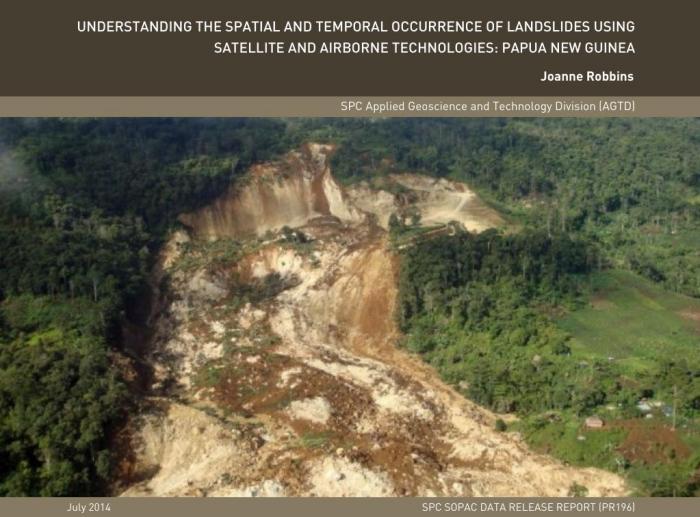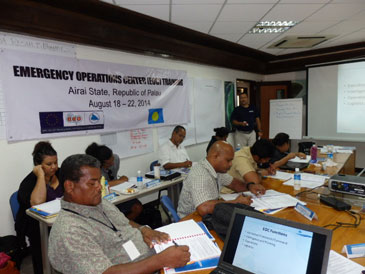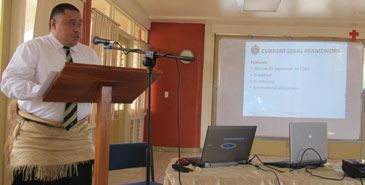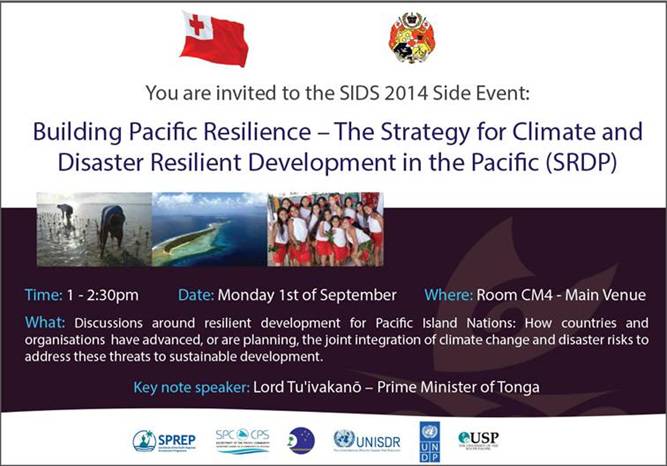SPC Publishes Ground-breaking Research on Landslides in Papua New Guinea that links Rainfall Variations with Landslide Incidence
Tuesday, 09 September 2014 10:59
administrator

Joanne Robbins, a scientist at the Met Office in the UK and working with the Secretariat of the Pacific Community (SPC) has just published a summary of her extensive PhD thesis through SPC.Joanne has been working for the past four years on her thesis which focuses on the temporal and spatial variability of landslides across the whole of Papua New Guinea (PNG) and the links between these events and changing rainfall patterns.
The project was jointly supervised between Professor Michael Petterson (formerly of the University of Leicester, UK and now Director of SPC Geoscience Division), Mr Ken Mylne (Met Office, UK), and Dr Joe Espi of the University of Papua New Guinea. PNG’s Mineral Resources Authority and the Department of Mineral Policy and Geohazards Management were also close collaborators with Joanne and provided support and advise throughout.
PNG’s position within the highly-dynamic Maritime Continent, and the rugged and varied topography across the PNG Highlands and high parts of islands such as Bougainville and New Britain, mean that numerous meteorological and geological processes interact to result in landslides across the country.
Joanne has documented that landslides occur more regularly at certain times of the year in PNG (e.g. during March April and May) and particularly during the wet La Nina episodes of the El Niño Southern Oscillation (ENSO). Landslides are less likely to occur during September and October and particularly during drier El Nino episodes.
Last Updated on Thursday, 19 March 2015 13:13
Read more...
|
SIDS Conference: Pacific partnerships Work to Progress Safe Drinking Water and Sanitation
Friday, 05 September 2014 09:39
administrator

4 September 2014, Secretariat of the Pacific Community (SPC), Apia, Samoa - Small island developing states of the Pacific face a set of difficult and complex challenges in securing safe drinking water and sanitation facilities for their citizens – challenges not easily addressed by single communities, organisations or sectors working in isolation. To make progress in the area of safe water and sanitation, the Secretariat of the Pacific Community (SPC) is convinced that a multi-sector, partnership approach is the key, and SPC is promoting the use of partnerships to tackle the region’s most difficult water and sanitation challenges head on.
Dr Colin Tukuitonga, SPC’s Director-General, feels that effective partnerships are the way forward in harnessing the energy and expertise needed to overcome the challenges of securing safe and sustainable drinking water and sanitation facilities. ‘At SPC we already work closely with our member countries and territories to help bring the various sectors together and demonstrate the benefits of sustainable water and sanitation solutions,’ Dr Tukuitonga said. ‘What we’re now seeing in the region is increasing collaboration between sectors, stakeholder groups, and also between Pacific Island countries and territories.’
Dr Tukuitonga was speaking in Apia at the United Nations Conference on Small Island Developing States, or SIDS, which is bringing together partners from across the globe to focus the world’s attention on a group of countries that remain a special case for sustainable development in view of their unique and particular vulnerabilities.
Last Updated on Friday, 05 September 2014 09:42
Read more...
Building capacity to manage emergency operations in Palau
Monday, 01 September 2014 15:18
administrator

Participants from Palau Government departments, Palau Red Cross and the media attended training last week on establishing and managing Emergency Operations Centers.
In 2012, Typhoon Bopha impacted Palau and affected hundreds of people and destroyed 70 homes, displacing 131 people, while in 2013, Super Typhoon Haiyan devastated the whole northern-most state of Kayangel, destroying 39 homes and severely damaging dwellings from Babeldaob to Koror.
These two events highlighted a need for Palau to increase the number of personnel trained to manage the response to emergencies and to work in the National Emergency Operations Center. The Secretariat of the Pacific Community (SPC), through support from the European Union project, Building Safety and Resilience in the Pacific, is working with Palau to address this need by providing training in Emergency Operations Centers for 17 representatives of government, civil society and the media.
Ms Priscilla Subris, Coordinator of the National Emergency Management Office, opened the week-long training by stressing the importance of all agencies working together and thanking participants for taking the time ‘to learn how to be part of Palau’s response to future emergencies’.
Last Updated on Monday, 01 September 2014 15:23
Read more...
|
Tonga a world leader in seabed minerals law
Monday, 01 September 2014 15:13
administrator

The Kingdom of Tonga this month became the first country in the world to put in place a law that manages seabed mineral activities within its national marine space and under its sponsorship in international waters.
Tonga’s Seabed Minerals Act 2014 was prepared with the assistance of the Deep Sea Minerals Project a partnership between the European Union (EU) and the Secretariat of the Pacific Community (SPC) and 15 Pacific Island countries. The Act received Royal Assent from the King of Tonga on 20 August 2014. This pioneering law, championed by Tonga’s Minister for Lands and Natural Resources and his staff, and led by the Kingdom’s Attorney-General’s Office, with SPC support, positions Tonga at the forefront of good governance for this emerging new industry.
Tonga, like Papua New Guinea, Fiji and Solomon Islands, has already received significant commercial interest in the seabed mineral potential within its national seas. Companies are currently conducting exploratory activities to learn more about Tonga’s ‘seafloor massive sulphide’ deposits. These chimney like structures, formed by hydrothermal activity at the seafloor thousands of metres below sea-level, are being feted as a new source for metals in global demand (such as copper, zinc, gold and silver) – and, if mined, would bring a new source of revenue for Tonga.
The industry is however an untested one: deep sea mining has not yet occurred anywhere in the world; its viability and environmental impact are yet to be determined.
Last Updated on Thursday, 19 March 2015 13:18
Read more...
SIDS 2014 Side Event: Building Pacific Resilience
Thursday, 21 August 2014 13:34
administrator
Last Updated on Tuesday, 26 August 2014 20:34
|
|
|
|
|
|
Page 9 of 74 |











